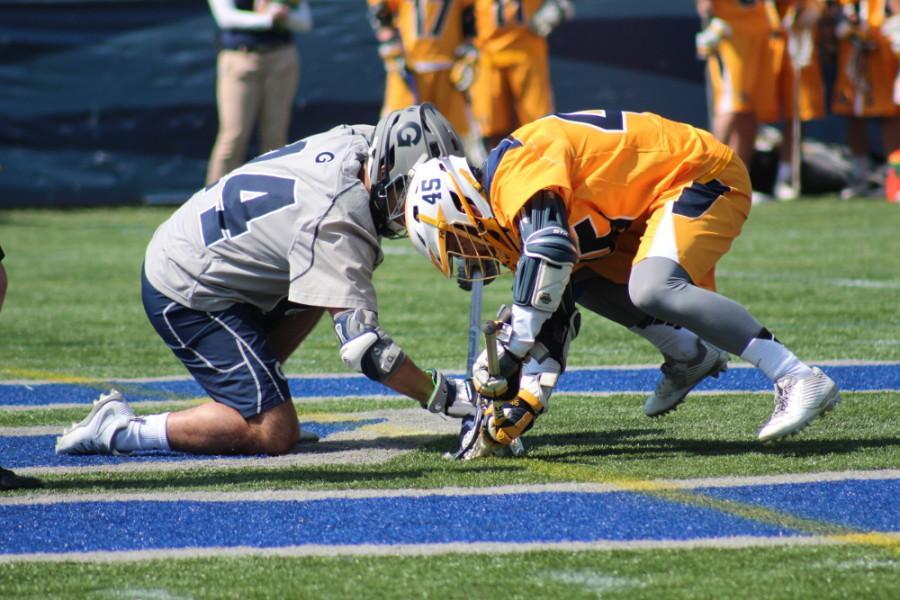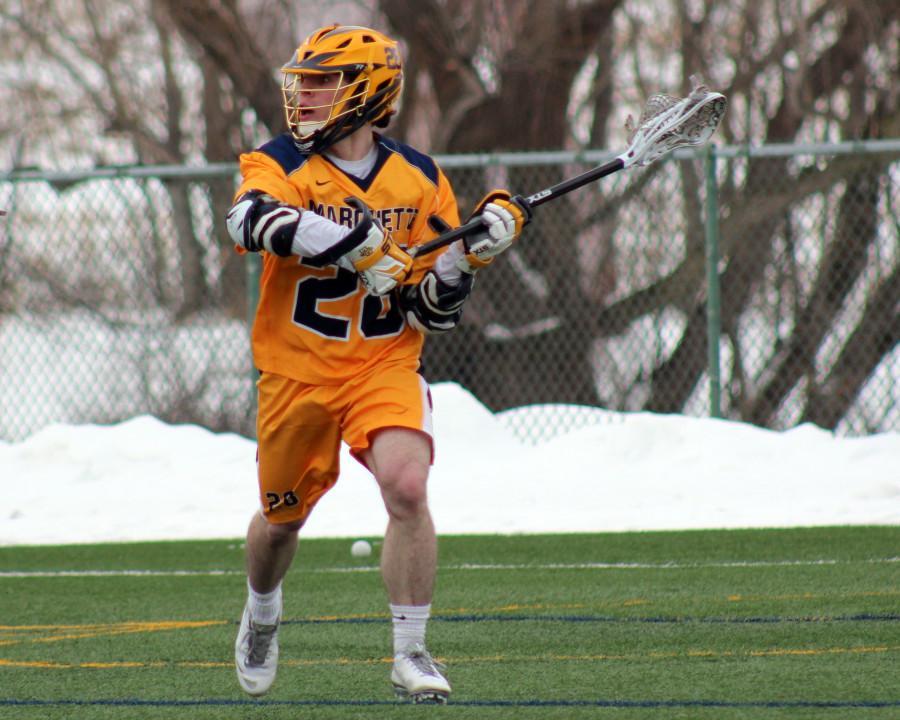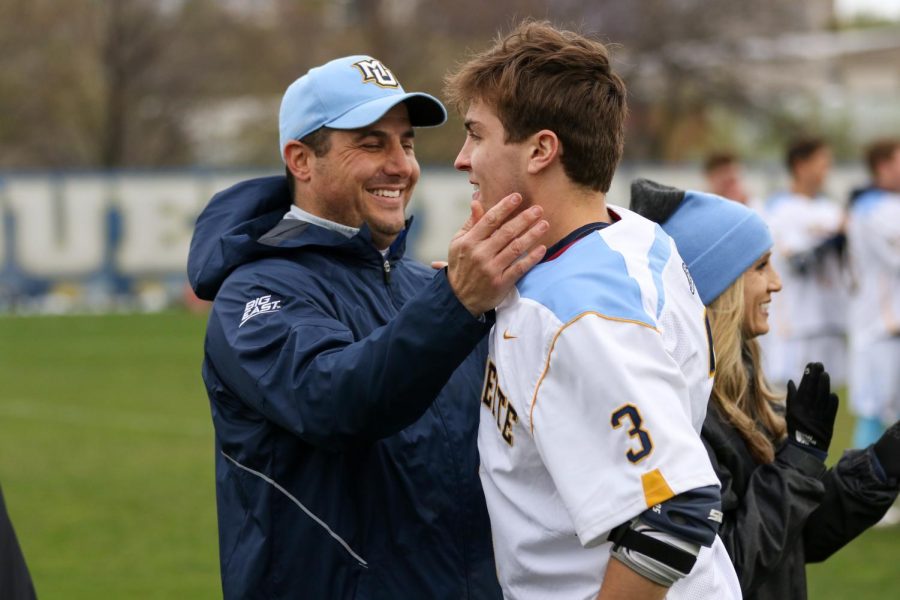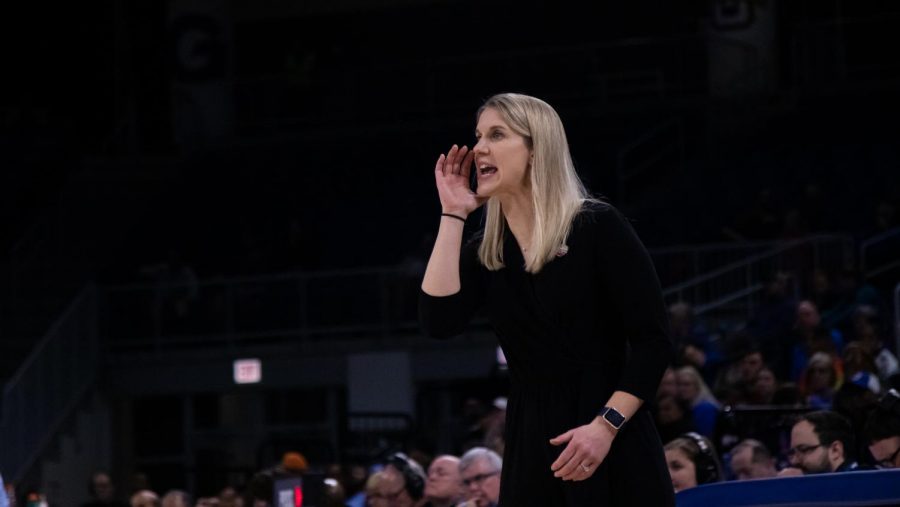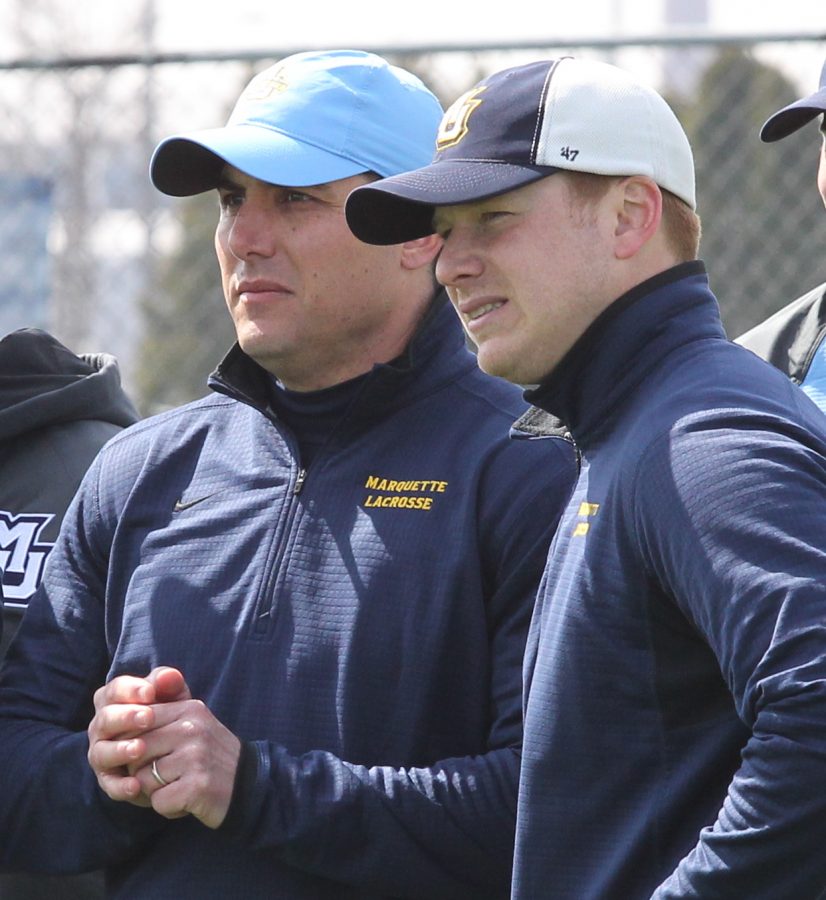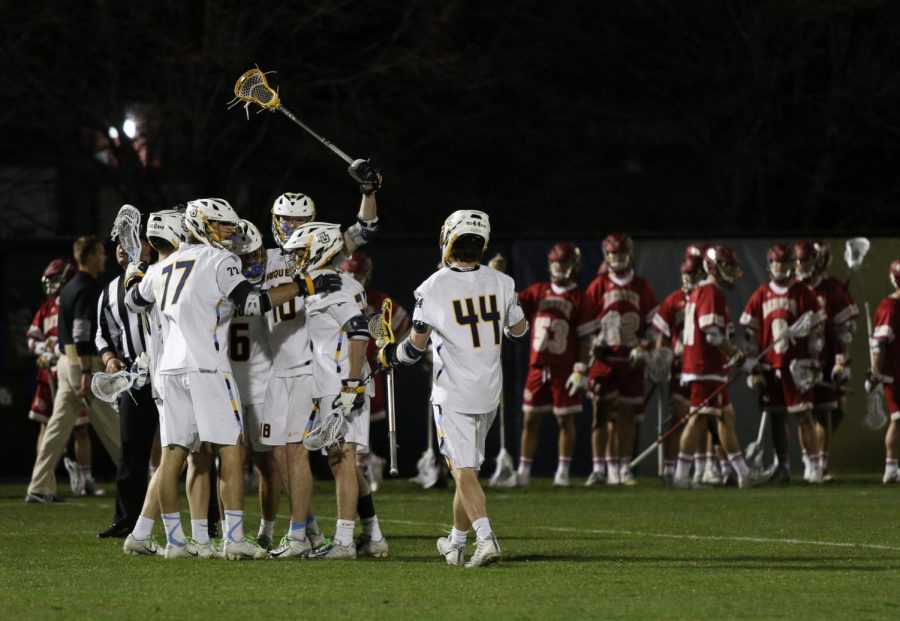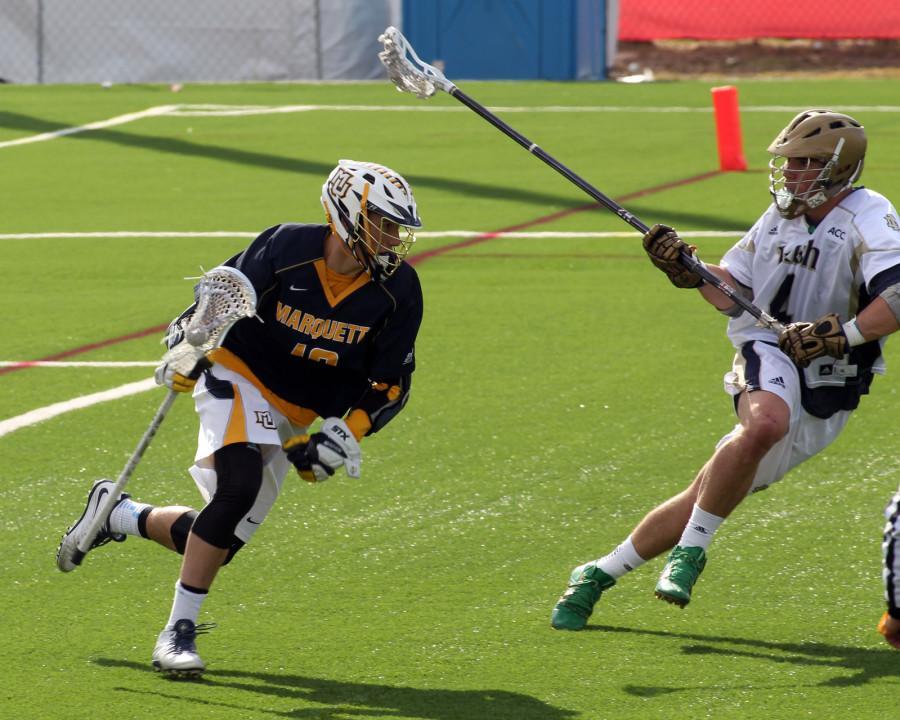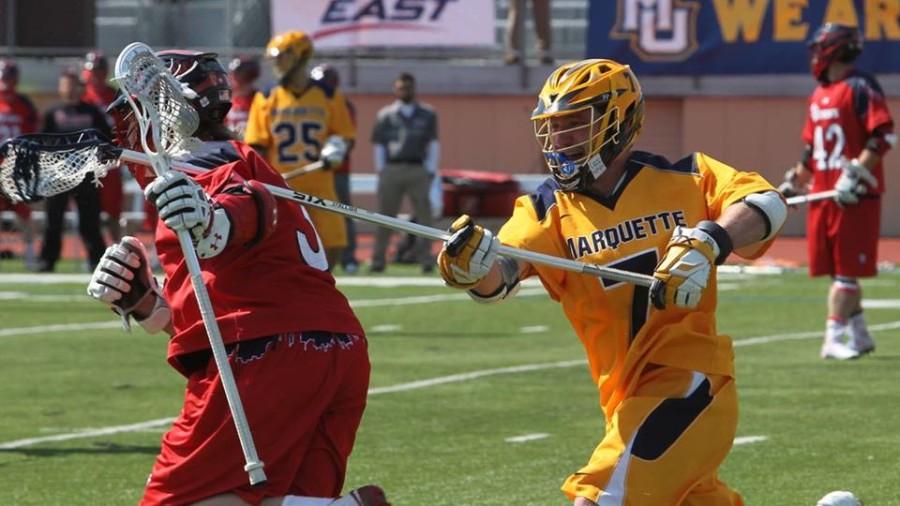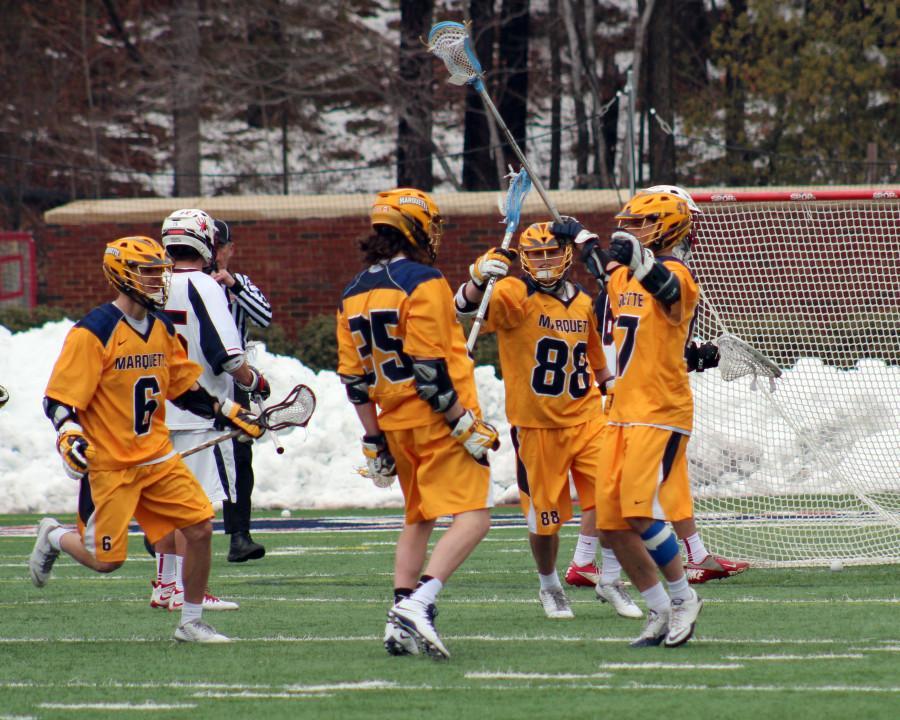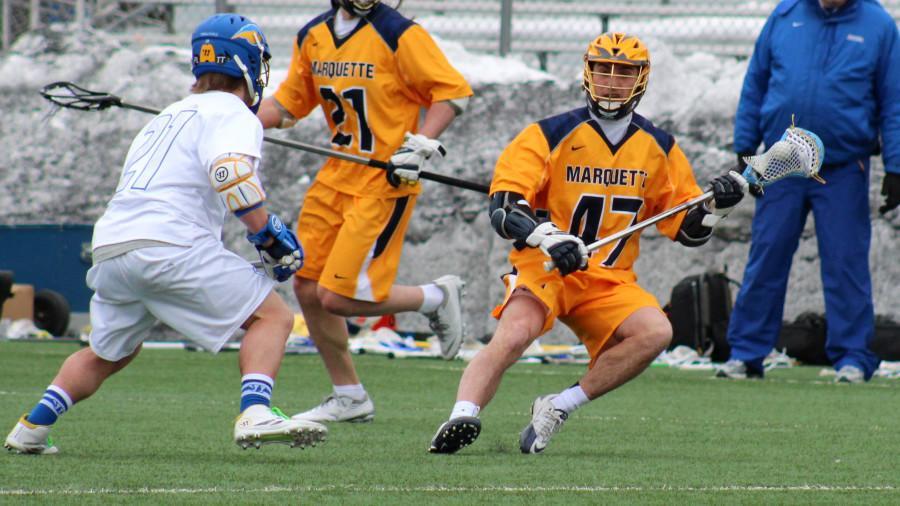Faceoff men are a rare breed in lacrosse. They have one goal recover the ball and then run off the field. It sounds simple, but faceoffs can play a pivotal factor in a game. In a sport without a consistent shot clock, possessions are vital.
Marquette has an interesting situation at the faceoff-X. The Golden Eagles rotate three players, always playing the hot hand. The strategy has worked for the team, as their faceoff performance is at the desired 50 percent through about half way through the season.
“I love it,” Marquette coach Joe Amplo said in regards to the faceoff competition. “I love their commitment to each other and their buy-in to our team culture. There’s no egos in that group.”
The primary faceoff man is redshirt junior K.C. Kennedy, who started this weekend against Georgetown. With this being his first season in the starting position, he already has taken twenty more faceoffs than he did last season. He’s been one of the most improved players on this year’s roster, upping his win percentage from .463 to .519.
“He works his tail off,” Amplo said. “He’s a kid that wasn’t recruited by anybody. I don’t even think we recruited him. I think he just showed up on our front doorstep and said he’s going to play lacrosse.”
Kennedy won more than 50 percent of his draws against Hofstra,
“I think getting more opportunities (has helped), going up against more guys this year as opposed to last year,” Kennedy said.
The team had previously split a majority of the draws between Cullen Cassidy and Paul Riportella in their first two seasons. After waiting in the wings for twoo years, Kennedy has finally earned an increase in playing time.
“It’s the job that everyone strives to have,” Kennedy said about his increased role. “It’s what I’ve worked for.”
Amplo praised Kennedy’s knowledge for the game.
“After every faceoff (assistant) coach Roberts, myself and K.C. have a meeting and decide what the next play is going to be,” Amplo said. “He’s almost a coach on the field.”
Kennedy was struggling at the start of this weekend’s game against Georgetown, so he and Roberts decided that it was time to switch in freshman Owen Weselak, who has over a .500 win percentage.
Weselak can be seen as the faceoff man of the future for the Golden Eagles. The 5-foot-11 freshman had an impressive debut earlier this season against Lehigh, winning nine of his 15 draws.
“He’s just a kid who needs to grow a little more, Amplo said. “He has great technique. He’s really fast with his hands. He’s trying to faceoff against a 22-year-old kid. He’s a freshman from California who probably the heaviest thing he lifted was his surf board before here.”
Weselak wasn’t able to crack the Georgetown faceoff unit either on Saturday, losing his two draws. The Golden Eagles decided to make a change once again.
Marquette finally solved their faceoff issues by inserting junior Gryphin Kelly into the lineup. After Marquette lost their first eight draws, Kelly helped the Golden Eagles win every faceoff in the second quarter. He won nine of 14 on the day.
“If there was an MVP for us to get back in the game, he was it,” Amplo said.
“I told him ‘There’s going to be a time when we’re going to need you,” Amplo said. “’You’re not going to know when it’s going to come, but there will be a time.’ It was in the second quarter of the Georgetown game, in the biggest game of the year.”
Kelly, who is playing his first season with the Golden Eagles after transferring from Hobart, also won six of his seven draws in the Golden Eagles blowout victory over Detroit earlier this month. His standup stance allowed him to match up better against the Hoyas.
“K.C. and I weren’t doing well against them, and then (Gryphin) comes in and he has a different style,” Weselak said. “He’s on his feet, not on a knee. He punches his back hand up a little more.”
“Being up on my feet gives me more mobility,” Kelly said.
Sharing playing time can be a bit difficult, but the unit says they each try their best to stay warmed up on the sidelines. You never know when the coaches will call your name, and you don’t want to be at a disadvantage.
“The more faceoffs you take the better rhythm you’re going to be in,” Kennedy said. “That’s something we actually worked on with the staff. If we’re going to make a change at the X, or start one guy, we are going to let him get into a rhythm. We’re not going to necessarily pull the plug after one bad faceoff.”
“Throughout the game you get more adjusted to the whistle,” Weselak said. “It’s hard coming into a game when it’s your first whistle and the other guy has had four or five faceoffs.”
Having three talented players can also have its advantages, as each player felt practicing against one another was making them better players.
“We’re all very different,” Kelly said. “Each of us have our own different style, especially here.”
“There’s a good mix of different styles, so it keeps it interesting,” Kennedy said. “Guys are always tinkering with what they’re doing pretty constantly. You’re getting new stuff that they’re trying. So if Owen is trying something at practice, that’s just another wrinkle I go up against.”
Having a competitive group is a good problem to have for the Golden Eagles, who have struggled in that facet of the game prior to this season. Marquette won just under 43 percent of their faceoffs in their inaugural season, and 44 percent in the sophomore campaign. This season, the team is up to 50 percent.
“We needed to get better there,” Amplo said. “We needed to be above 50 percent.”
Struggles with draws isn’t uncommon among the new programs. Faceoff men are one of the hardest things to find when putting together a team. If you do find one, he can be the foundation for success.
“In high school you can be a great faceoff kid, but that doesn’t translate to a great faceoff kid at the college level,” Amplo said. “It’s hard to evaluate the speed and your technique against most high school players because there’s not great depth of faceoff talent. You very rarely see the best kid going against the best kid.”
Marquette seems to have found a few capable of taking them to the next level, an important factor in the team already breaking their program record for wins in a season.

